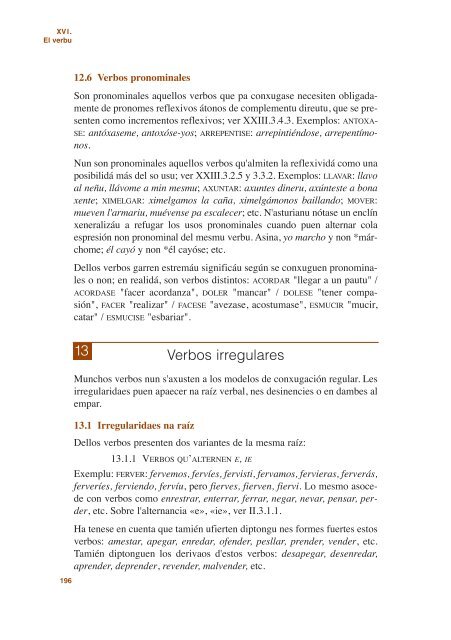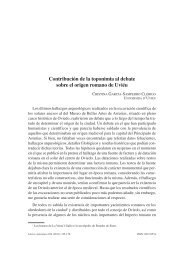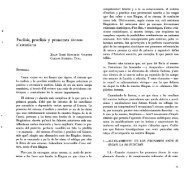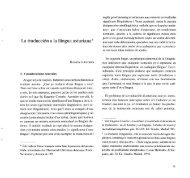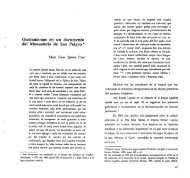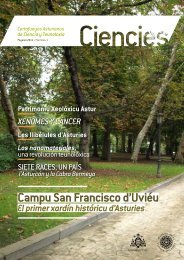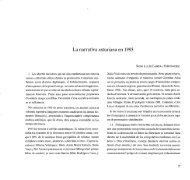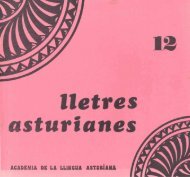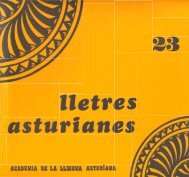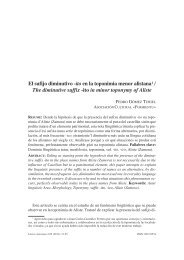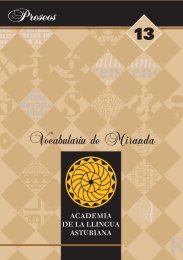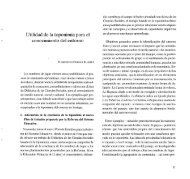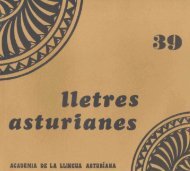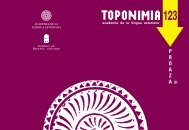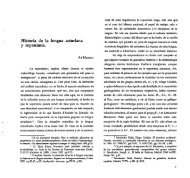- Page 1 and 2:
Tercera edición Uviéu, 2001 Acade
- Page 3 and 4:
Uviéu, 2001 Academia de la Llingua
- Page 5 and 6:
Índiz xeneral Entamu 9 FONOLOXÍA
- Page 7 and 8:
4. Menes d’interxeiciones 165 5.
- Page 9 and 10:
Entamu De magar la so creación pol
- Page 11 and 12:
afayadizu y universal, inxertando t
- Page 13 and 14:
Morfoloxía 13
- Page 15 and 16:
1 L'alfabetu L'alfabetu asturianu E
- Page 17 and 18:
Exemplos: llingua, parllar, mariell
- Page 19 and 20:
f) Pa indicar qu'una pallabra sigue
- Page 21 and 22:
c) La omisión de daqué que nun se
- Page 23 and 24:
1 Les vocales Sistema vocálicu El
- Page 25 and 26:
En munches ocasiones podrá duldase
- Page 27 and 28:
) N'otres munches ocasiones, la «i
- Page 29 and 30:
a) Escribiráse «u» cuando una pa
- Page 31 and 32:
gua escrita nos plurales de diversu
- Page 33 and 34:
k) Na 1ª persona del singular del
- Page 35 and 36:
vocal final de pallabra con otra in
- Page 37 and 38:
1.3 Fonema /ĉ/ El fonema /ĉ/, rea
- Page 39 and 40:
- Cuando s'asitia al comienzu de pa
- Page 41 and 42:
1.15 Fonema /n/ El fonema /n/, real
- Page 43 and 44:
Los fonemes /r/ y /r- / nun s'opone
- Page 45 and 46:
) Na terminación -eda. Exemplos: c
- Page 47 and 48:
que representen, respeutivamente /
- Page 49 and 50:
2.11 Lletres «r» y «rr» Na escr
- Page 51 and 52:
1 La sílaba Carauterístiques xene
- Page 53 and 54:
Exemplos: traéi, Faéu, creáis, e
- Page 55 and 56:
Ye d'observar que les lleis combina
- Page 57 and 58:
D'esta miente, escribiránse con «
- Page 59 and 60:
4.5 Adautación de p final de síla
- Page 61 and 62:
d) La «-b» final de pallabra calt
- Page 63 and 64:
-bsc- > -sc-: escuru, ascisa -bst-
- Page 65 and 66:
1 L'acentu Carauterístiques del ac
- Page 67 and 68:
a) Toles pallabres agudes acabaes e
- Page 69 and 70:
Nos compuestos xebraos por guión c
- Page 71 and 72:
exemplu, nun enunciáu como con est
- Page 73 and 74:
Morfoloxía 73
- Page 75 and 76:
midíes y percibíes polos sentíos
- Page 77 and 78:
1.2.4 NOMES COMUNES Y NOMES PROPIOS
- Page 79 and 80:
1.3 Axetivación del sustantivu Los
- Page 81 and 82:
interrogativos (¿qué camín?, ¿c
- Page 83 and 84:
2.4 Sustantivación del axetivu Un
- Page 85 and 86:
1 El xéneru y el númberu El xéne
- Page 87 and 88:
panaderu, la panadera; facederu, fa
- Page 89 and 90:
pertenecen a los que presenten vari
- Page 91 and 92:
3 El númberu. Singular y plural El
- Page 93 and 94:
-DERU / -DEROS: l'atechaderu, los a
- Page 95 and 96:
pá bonal, pas bonales; él ye mang
- Page 97 and 98:
1 L'artículu tien estes formes: L'
- Page 99 and 100:
otres, son dambos. Por exemplu, pel
- Page 101 and 102:
L'artículu apaez siempre asociáu
- Page 103 and 104:
1 Los demostrativos Formes de los d
- Page 105 and 106:
pospuestos (l'home esti, la muyer e
- Page 107 and 108:
1 Los posesivos Formes de los poses
- Page 109 and 110:
Exemplos: - El neñu mio, el neñu
- Page 111 and 112:
ances a "les esperances d'ellos o d
- Page 113 and 114:
4 Ye la casa d'él o d'elli Ye la c
- Page 115 and 116:
1 Los indefiníos Carauterístiques
- Page 117 and 118:
ellos dixeron lo que-yos paeció; l
- Page 119 and 120:
finíos establecen una comparanza,
- Page 121 and 122:
Como axetivos antepuestos, los masc
- Page 123 and 124:
Davezu, l'indefiníu un una uno pon
- Page 125 and 126:
Les formes del masculín singular t
- Page 127 and 128:
1 Los numberales Carauterístiques
- Page 129 and 130:
"non cuatro", andaben tres llobos y
- Page 131 and 132:
100 centésimu -a -o, centenu -a -o
- Page 133 and 134:
tidá de referencia pue ser un núm
- Page 135 and 136:
Sicasí, el fraccionariu pue entend
- Page 137 and 138:
nes del castañéu. En dellos usos,
- Page 139 and 140:
"gran cantidá de daqué", ensin m
- Page 141 and 142:
1.2 Pronomes personales tónicos y
- Page 143 and 144:
MASCULÍN FEMENÍN NEUTRU SINGULAR
- Page 145 and 146: les llárimes, pero tengo que m'ens
- Page 147 and 148: apaez. Asina, por exemplu: el neñu
- Page 149 and 150: 1 L'alverbiu Carauterístiques func
- Page 151 and 152: otru elementu de la oración o del
- Page 153 and 154: Dalgunos alverbios organícense al
- Page 155 and 156: noticies d'amunchayá. Cuantagüéi
- Page 157 and 158: Nun hai que-y lo dicir, non; hai qu
- Page 159 and 160: ches, al escuchu, al pezopé "a la
- Page 161 and 162: 1 Les interxeiciones Carauterístiq
- Page 163 and 164: etc. Nesti sen, na mayoría de los
- Page 165 and 166: 4 Menes d'interxeiciones 4.1 Según
- Page 167 and 168: cras o catacrás (un golpe, trastaz
- Page 169 and 170: arre (p'afalar les caballeríes) bi
- Page 171 and 172: ixuxú (allegría o desafíu) madi
- Page 173 and 174: (comen mazanes), complementu indire
- Page 175 and 176: individuos (el neñu espatuxa / los
- Page 177 and 178: do vien?, ¿quién ye?). Pelo contr
- Page 179 and 180: encies cronolóxiques presentes o p
- Page 181 and 182: El calter imperfeutivu o de non per
- Page 183 and 184: - Posibilidá contemplada dende'l p
- Page 185 and 186: como tou sustantivu, l'infinitivu p
- Page 187 and 188: 10.4.1 DELLOS USOS DEL XERUNDIU La
- Page 189 and 190: 11 Esquema de les variaciones morfo
- Page 191 and 192: 12.1 Verbu regular de la 1ª conxug
- Page 193 and 194: 12.3 Verbu regular de la 3ª conxug
- Page 195: CER fai conozo, conoces, conoz, con
- Page 199 and 200: dolgáis (o doláis); VALIR: vales,
- Page 201 and 202: CONSTRUIR: constrúis, constrúi, c
- Page 203 and 204: sía fora ~ fore sías foras ~ fore
- Page 205 and 206: 13.3.3 VERBU HABER Presenta les ra
- Page 207 and 208: 13.3.5 VERBU DAR Presenta les raíc
- Page 209 and 210: 13.3.7 VERBU DIR Presenta les raíc
- Page 211 and 212: 13.3.9 VERBU PODER Presenta les ra
- Page 213 and 214: 13.3.11 VERBU QUERER Presenta les r
- Page 215 and 216: 13.3.13 VERBU SABER Presenta les ra
- Page 217 and 218: 13.3.15 VERBU TRAER O TRAYER Presen
- Page 219 and 220: 13.3.17 VERBU VER Presenta les raí
- Page 221 and 222: ensin indicar el fin. Exemplos: eso
- Page 223 and 224: TAR POR + INFINITIVU Espresa qu'una
- Page 225 and 226: TENER + PARTICIPIU Perífrasis perf
- Page 227 and 228: tremenda. Nel casu de quien y cuant
- Page 229 and 230: 1 Interrogativos y esclamativos Los
- Page 231 and 232: 1.4 Función y emplegu Los interrog
- Page 233 and 234: MENES D’ENTRUGA CON Ú Ónde y ú
- Page 235 and 236: 1 Les preposiciones Formes Les prep
- Page 237 and 238: el chaplón clavélu con un martiel
- Page 239 and 240: que, tu nun yes quien a comelo, tu
- Page 241 and 242: Exemplos: faló col fíu de Miguel,
- Page 243 and 244: ) Desaveramientu, dixebra, separtam
- Page 245 and 246: ) Direición, con referencia espaci
- Page 247 and 248:
a) La preposición haza ~ hacia ind
- Page 249 and 250:
per + allá ’ pellá (tamién: pe
- Page 251 and 252:
4.15.3 OTROS EMPLEGOS La preposici
- Page 253 and 254:
La preposición tres pue usase sola
- Page 255 and 256:
Y, pa cabu, otres tán formaes a ba
- Page 257 and 258:
1 Les conxunciones Carauterístique
- Page 259 and 260:
PERO, MAS Pero indica que se contra
- Page 261 and 262:
QUE (QU') Exemplos: que nun ye asin
- Page 263 and 264:
CONDICIONALES SI CONDICIONAL Exempl
- Page 265 and 266:
con otros elementos del sintagma o
- Page 267 and 268:
a un referente suxetivu (onde yá n
- Page 269 and 270:
- Dende un verbu: alloriar ’ allo
- Page 271 and 272:
cada, lluna ’ llunada, neñu ’
- Page 273 and 274:
- "Xentiliciu": Asturies ’ asturi
- Page 275 and 276:
- "Aición y efeutu de poca intensi
- Page 277 and 278:
homazu, mozu ’ mozazu, muyer ’
- Page 279 and 280:
moyar ’ moyadura, quemar ’ quem
- Page 281 and 282:
u, goxa ’ goxeru, lleche ’ llec
- Page 283 and 284:
-EXAR Sufixu semiproductivu, non ca
- Page 285 and 286:
-IEGU, -IEGA, -IEGO o -EGU, -EGA, -
- Page 287 and 288:
- "Aición y efeutu curtiu y poco i
- Page 289 and 290:
daqué". Exemplos: asturianu ’ as
- Page 291 and 292:
tantivu o axetivu. Significáu: "pr
- Page 293 and 294:
-UEPU, -UEPA Sufixu improductivu, n
- Page 295 and 296:
A- ~ AN- (ante vocal) Prefixu semip
- Page 297 and 298:
DE- Prefixu improductivu, non categ
- Page 299 and 300:
EU- Prefixu improductivu, non categ
- Page 301 and 302:
MONO- Prefixu productivu, categoriz
- Page 303 and 304:
QUILO- ~ KILO- Prefixu improductivu
- Page 305 and 306:
TETRA- Prefixu improductivu, non ca
- Page 307 and 308:
-ED- -ed- + -iciu: llamber ’ llam
- Page 309 and 310:
4.1.1 CLASIFICACIÓN DE LES PALLABR
- Page 311 and 312:
- automóvil > auto-: pista ’ aut
- Page 313 and 314:
cer, podre ’ apodrecer, ricu ’
- Page 315 and 316:
6 Encurtiamientu y allargamientu de
- Page 317 and 318:
Morfoloxía 317
- Page 319 and 320:
sele, la espresión que falen sele
- Page 321 and 322:
llibru escritu, un bon direutor alm
- Page 323 and 324:
cuntable. Asina entós, l'axetivu e
- Page 325 and 326:
Les siguientes menes d'axetivos pue
- Page 327 and 328:
• Sustantivos de conteníu neutru
- Page 329 and 330:
C) TRESPOSICIÓN ALVERBIU ’ AXETI
- Page 331 and 332:
La preposición de enxamás desapae
- Page 333 and 334:
pospuestu mio, to y so tienen termi
- Page 335 and 336:
grupu sintagmáticu: más pan, meno
- Page 337 and 338:
tamién en secuencies de conteníu
- Page 339 and 340:
tantivu, siendo capaz entós d'exer
- Page 341 and 342:
sacos, delles veces éntra-y el sue
- Page 343 and 344:
- Si los sustantivos son de xéneru
- Page 345 and 346:
1 La oración y les funciones oraci
- Page 347 and 348:
2 La oración 2.1 Carauterístiques
- Page 349 and 350:
De toes maneres, el suxetu gramatic
- Page 351 and 352:
desanicie toa necesidá de concorda
- Page 353 and 354:
tescu cercanu: llamaron a pá, ¿nu
- Page 355 and 356:
) Verbos transitivos qu'espresen la
- Page 357 and 358:
3.3.3 DATIVU D’INTERÉS Los verbo
- Page 359 and 360:
esperar (por), quexar / quexase (de
- Page 361 and 362:
A diferencia del restu de les funci
- Page 363 and 364:
función de complementu circunstanc
- Page 365 and 366:
es, nun sabes pa ú te lleven, quie
- Page 367 and 368:
Sicasí, nel siguiente exemplu la p
- Page 369 and 370:
4.5 Allugamientu con complexos verb
- Page 371 and 372:
daquién, el to llapiceru paez esi
- Page 373 and 374:
calidá d'axetivos, talos sintagmes
- Page 375 and 376:
Cuando esti atributu ye axetivu, co
- Page 377 and 378:
ta metío na corte, bien caro ta'l
- Page 379 and 380:
I) SECUENCIES LO DE QUE + ORACIÓN
- Page 381 and 382:
1 Oración compuesta y oración com
- Page 383 and 384:
2.1 Oraciones trespuestes sustantiv
- Page 385 and 386:
contestu. Exemplos: el rei que meyo
- Page 387 and 388:
per onde ~ per u trabaya'l pá, Mó
- Page 389 and 390:
Queden convertíes n'alverbios en f
- Page 391 and 392:
Magar que nun respuenden a les cara
- Page 393 and 394:
Índiz alfabéticu de materies A, c
- Page 395 and 396:
Adautación d’hiatos nos cultismo
- Page 397 and 398:
Alverbialización de sustantivos XI
- Page 399 and 400:
Apostrofación p’ XIX.4.13.1 Apó
- Page 401 and 402:
-Az, sufixu XXI.3.2.2 -Az, terminac
- Page 403 and 404:
XXII.2.3.2 a) / 2.3.2 b) Concordanc
- Page 405 and 406:
Conxunciones de llugar XX.3.2.2, XX
- Page 407 and 408:
De nenguna de les maneres, locució
- Page 409 and 410:
Dosmilésimu -a -o, numberal ordina
- Page 411 and 412:
Enunciáu: carauterístiques funcio
- Page 413 and 414:
axetivu + de VI.2.3.2 Grupos conson
- Page 415 and 416:
Indefiníos neutros XI.2.1.2 / 2.2.
- Page 417 and 418:
Iterativos o frecuentativos, verbos
- Page 419 and 420:
Millónésimu, numberal fraccionari
- Page 421 and 422:
-Nomía, raíz afixa XXI.4.2 Nomina
- Page 423 and 424:
V.3.6.1b, XI.3.1 Nun biribí, locuc
- Page 425 and 426:
Penta-, prefixu XXI.3.3 Pente, cont
- Page 427 and 428:
3.1 d) / 3.3 / 5.1 Prefixu estra- I
- Page 429 and 430:
Pronome se impersonalizador XXIII.3
- Page 431 and 432:
Se complementu direutu reflexivu XX
- Page 433 and 434:
Sufixu -itu -ita -ito XXI.3.2.2 / 3
- Page 435 and 436:
Terminación de femenín -éu / -ed
- Page 437 and 438:
XX.3.2.2, XXV.2.2.6 U, vocal átona
- Page 439 and 440:
Verbu albortar II.3.1.3 b), XVI.13.
- Page 441 and 442:
Verbu pescar II.3.1.1 a), XVI.13.1.
- Page 443 and 444:
443


